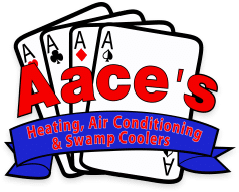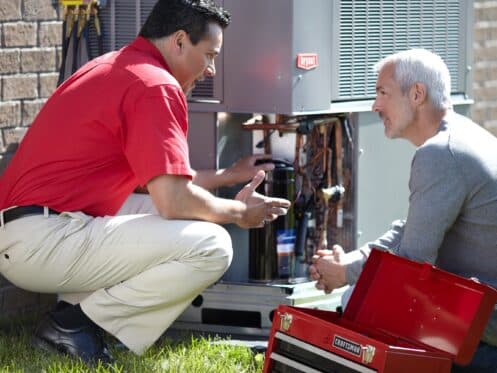Most air conditioners are expected to last between 15 and 20 years. Whether you’ve just had new cooling equipment installed in your Victorville, CA home or you’ve had your air conditioner for quite a while, there are seven easy ways to stave off the need for early replacement.
1. Make Sure Your Air Conditioner Is the Correct Size
Efforts to preserve the lifespan of home cooling equipment should begin at installation. Improper AC sizing causes a host of problems for homeowners. If your AC is too large for your home, it will cycle on and then quickly turn back off before it’s able to remove excess humidity and create your preferred indoor temperature. Short, rapid cycles like these expedite normal wear and cause air conditioners to malfunction and fail long before their time.
Similar problems can occur with an air conditioner that’s too small for the intended area. Although smaller units are often cheaper than larger models, they’re neither effective nor efficient in the wrong environments. If your AC is too small for your home, it will run nearly all the time just to create semi-comfortable conditions. The added stress and accelerated wear of longer than average cycles will reduce an under-sized air conditioner’s lifespan significantly.
With air conditioners, sizing has less to do with the physical dimensions of AC models and more to do with their cooling power. The only way to accurately determine your home’s needs for cooling power is by having a Manual J load calculation performed by a licensed HVAC technician. In addition to square footage, Manual J calculations account for ceiling heights, the amount of livable area being serviced, and factors specific to the building’s envelope. Everything thing from the type and size of your windows to the amount of insulation that’s present will be reviewed during a Manual J calculation.
Manual J calculations are so complex that they’re often performed using highly specialized software. Once your HVAC installer has determined the ideal amount of cooling power for your home, choosing the best unit will be easy. When correctly sized, an air conditioner will be subjected to less stress during operation, and it will sustain far less wear as a result.
2. Change Your Air Conditioner’s Air Filter Often
One of the easiest ways to protect the health and longevity of your home cooling equipment is by checking and changing its filter on a regular basis. Generally, you should inspect this component monthly. Whenever it’s covered in a thick, lint-like mat of collected debris, you should put a clean one in. AC air filters typically last between one and three months, but yours may need to be changed more or less often based on your home’s location and its indoor air quality (IAQ).
Living near a busy freeway is one factor that can create the need for monthly or more frequent filter changes. Having multiple indoor pets is another. If you have indoor smokers in your household, you may want to check your AC filter every three weeks.
3. Schedule Annual AC Tune-Up Service
Annual air conditioner maintenance is essential for ensuring compliance with the terms of home warranty agreements, product manufacturer agreements, and home insurance plans. If you want to continue enjoying the protections that these mutually binding agreements provide, you should have a professional give your cooling system a thorough inspection, cleaning, and tune-up just before the start of the cooling season.
During our annual AC tune-up service, we:
- Inspect and clean the outside condenser unit
- Inspect and adjust all blower components
- Check refrigerant levels and provide recharge service if needed
- Inspect the run capacitor
- Inspect and clean the condensate drain line
We also replace all worn or missing parts, and we make sure that all physical components are securely attached. These visits give us the opportunity to optimize air pressure levels within the system by removing build-ups of dirt, dust, and other particulates that have bypassed or blown off the HVAC air filter. With annual AC service, small and seemingly unimportant problems can never spiral out of control.
4. Take Good Care of Your HVAC Air Ducts
The health and integrity of your HVAC ductwork has a major impact on your cooling equipment. Torn HVAC air ducts and other air leaks place undue stress on heaters and air conditioners by making them work a lot harder than they should because air will continually escape. Not only does this accelerate wear and tear, but it also leads to higher-than-normal home energy bills. You can avoid these and other problems by having your HVAC air ducts inspected once each year. This inspection can be scheduled at the same time as your AC tune-up for decreased costs and increased convenience. You should also replace your home’s ductwork once every 10 years and have your air ducts cleaned every three to five years.
5. Report Minor Problems Right Away
Failing to report developing issues can lead to early equipment failure. It’s far better for your cooling system if essential repairs are performed right away. You should contact us for AC repairs if:
- You have hot and cold spots in your home when the AC is on
- Your air conditioner is making strange sounds
- Your air conditioner is emitting unpleasant smells
- Your air conditioner quickly cycles off and on
It’s also a good idea to reach out for support if your AC unit keeps tripping the circuit breaker. Identifying the underlying causes of these issues early on will ensure that small problems never increase in magnitude, affect other nearby components, or cause your system to overheat and fail.
6. Only Have Your Air Conditioner Serviced by Licensed HVAC Technicians
Your air conditioner should only be serviced by licensed HVAC technicians. Hiring a handyman or attempting to perform repair work on your own could cause your manufacturer warranty to be voided. Although there are a lot of detailed, do-it-yourself tutorials online, every air conditioner model has its own nuances and requirements that only a seasoned professional can understand. To give your AC the needs-specific care it deserves, give us a call whenever you suspect that there’s a problem.
7. Stay on Top of HVAC Air Vent and Condenser Maintenance
In addition to routine filter changes, there are several other AC maintenance tasks that you can and should regularly tackle on your own. For instance, you should check the HVAC air registers, vents, and grilles throughout the home each month. Make sure that these are open and that no build-ups of debris are blocking airflow. If there are build-ups, wipe them away with a damp cloth. Larger accumulations can be cleared with your vacuum cleaner hose.
At the outside condenser unit, there should always be at least two feet of clearance at every side. In the spring, this means that you’ll have to regularly visit this unit to ensure that overgrown shrubs, grass, or weeds aren’t blocking the movement of air. Clear away all leaves, twigs, and other debris. You should also be on the lookout for signs of pests that have worked their way into your condenser. These units are known to attract rodents, birds, and insects in search of warmth and shelter. If there’s a nest or a visible infestation in your condenser, schedule AC service right away.
We’ve been serving Victorville, California and the surrounding areas since 2007. We provide air conditioner and heater repair, installation, and maintenance services. We also install, maintain, and repair swamp coolers. To find out about our preventative maintenance plans or to schedule an appointment, contact Aace's Heating, Air Conditioning & Swamp Coolers today!
Services We Offer include:






